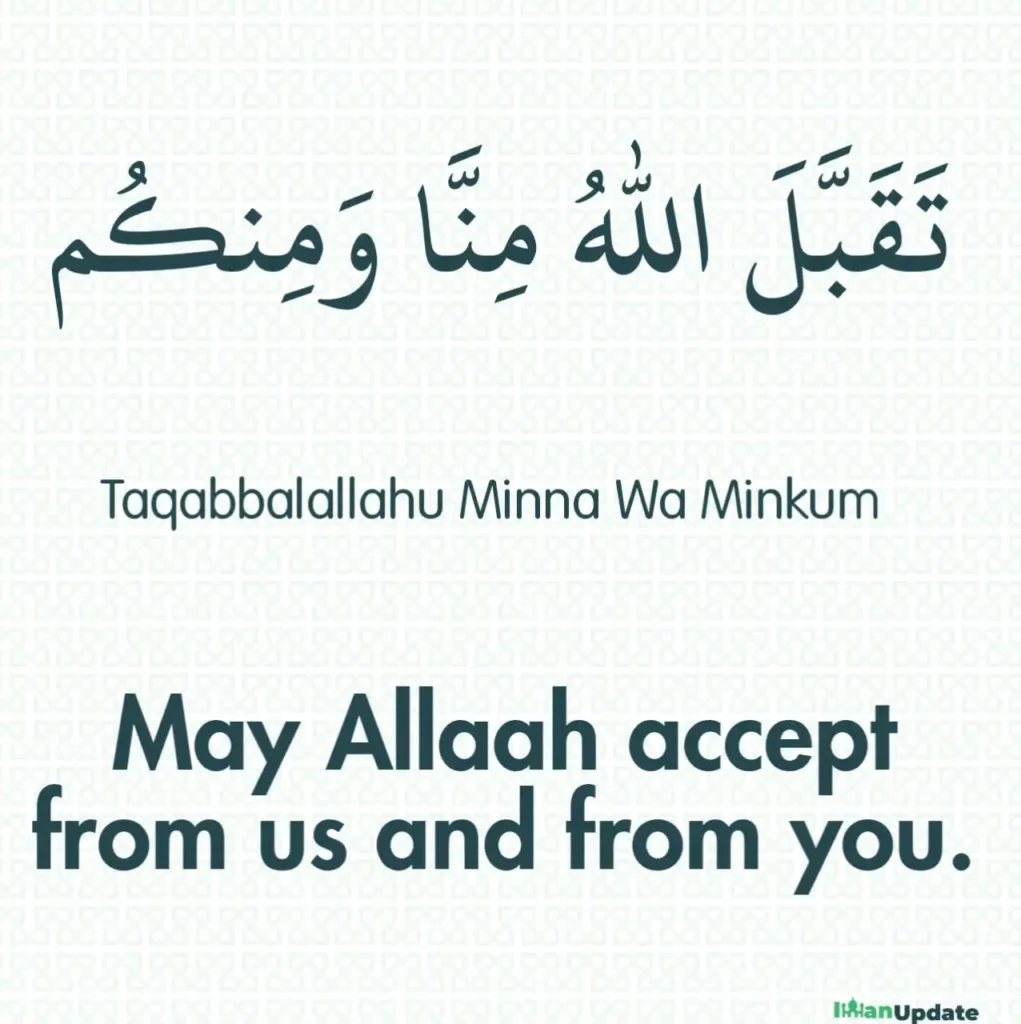Taqabbalallahu Minna Wa Minkum in Arabic, Meaning, & Response

The phrase “Taqabbalallahu minna wa minkum” is a beautiful Arabic supplication exchanged among Muslims, especially during the festival of Eid al-Fitr and Eid al-Adha.
This phrase holds significant spiritual value as it represents a mutual prayer asking Allah to accept the worship and good deeds performed during sacred times.
While it is most commonly used during Eid, many Muslims also say this phrase at the conclusion of Ramadan, expressing hope that Allah will accept their fasting, prayers, and all forms of worship carried out during the holy month.
The phrase not only fosters a sense of brotherhood and goodwill among Muslims but also reflects their deep devotion and gratitude to Allah.
Taqabbalallahu Minna Wa Minkum in Arabic Text
The Arabic text of the phrase is as follows:
تَقَبَّلَ اللهُ مِنَّا وَمِنكُم
Taqabbalallahu Minna Wa Minkum Meaning in English
In English, “Taqabbalallahu minna wa minkum” translates to: “May Allah accept (this worship) from us and from you.”
The word “Taqabbal” means “to accept,” while “minna” means “from us,” and “wa minkum” means “from you.”
Together, this phrase is an earnest prayer, asking Allah to accept the acts of worship and obedience performed by both the person saying it and the one receiving the greeting.
The Importance of This Supplication
This supplication holds a deep meaning within the Islamic tradition. It signifies the conclusion of significant religious events, such as fasting during Ramadan or the performance of Hajj, and seeks divine approval for the efforts made in these acts of worship.
By sharing this phrase, Muslims affirm their shared spiritual journey and mutual hopes for Allah’s mercy and forgiveness.
The phrase not only highlights the importance of humility before Allah but also strengthens the sense of community, reminding Muslims of their collective responsibility to seek divine acceptance and to pray for one another.
READ ALSO: Dua of Arafah: Everything You Need to Know
Transliteration and Pronunciation
Here are some common transliterations to assist with pronunciation for non-Arabic speakers:
- Taqabbal allahu minna wa minkum
- Taqabbalallahu minna wa minkum
- Taqabbal-Allâhu minnâ wa minkum
- Taqaballahu minna wa minkum
You may notice slight variations in the transliterations, but the meaning and pronunciation remain essentially the same. This transliteration helps those unfamiliar with Arabic script pronounce the phrase properly and participate in this beautiful supplication.

When to Use Taqabbalallahu Minna Wa Minkum
“Taqabbalallahu minna wa minkum” is most commonly used during Eid celebrations, particularly when Muslims greet each other after the Eid prayer.
It is also exchanged at the end of Ramadan as a way of acknowledging the spiritual efforts made during the month.
This phrase represents a shared hope that Allah will accept the fasting, prayers, and good deeds performed by both the person saying it and the recipient.
In many cultures, it is also customary to exchange this phrase during family and community gatherings, reinforcing bonds of faith and love. It’s an expression of mutual support in seeking Allah’s favor.
Response to Taqabbalallahu Minna Wa Minkum
When someone greets you with “Taqabbalallahu minna wa minkum,” the most appropriate response is to repeat the same phrase back to them: “Taqabbalallahu minna wa minkum.”
Alternatively, you can also say “Ameen,” which means “May it be so.” This is a way of affirming the prayer and expressing mutual goodwill.
Here’s an example of a simple exchange:
Person 1: “Eid Mubarak!”
Person 2: “Taqabbalallahu minna wa minkum.”
Person 1: “Taqabbalallahu minna wa minkum, Ameen.”
The act of repeating this supplication fosters a sense of unity and shared spiritual intent during Eid, helping to strengthen the bonds within the Muslim community.
The Tradition of Saying Taqabbalallahu Minna Wa Minkum
The practice of exchanging the phrase “Taqabbalallahu minna wa minkum” dates back to the time of the Prophet Muhammad (peace be upon him) and his companions.
According to several narrations, the companions of the Prophet (peace and blessings of Allah be upon him) would greet one another with this phrase after completing acts of worship during Eid.
Jubayr ibn Nufayr reported: “When the companions of the Messenger of Allah (peace and blessings of Allah be upon him) met on the day of Eid, they would say to one another, ‘Taqabbalallahu minna wa minkum.’“
This practice has been endorsed by many scholars, including Imam Ahmad, who stated that there is no harm in saying this supplication on Eid.
Ruling on Saying Taqabbalallahu Minna Wa Minkum
Saying this supplication is not obligatory, but it is a recommended Sunnah (an act that is recommended based on the practice of the Prophet and his companions). The phrase is widely accepted among scholars, and it is viewed as a meritorious act that helps to increase love and brotherhood among Muslims.
There is no specific ruling that makes this phrase mandatory, but it is a beautiful way of fostering goodwill and mutual prayers, especially during festive seasons like Eid.
Etiquettes of Eid
In addition to exchanging greetings like “Taqabbalallahu minna wa minkum,” there are several other etiquettes associated with Eid that enhance the spiritual and communal experience:
1. Offering Congratulations and Salutations
It is customary for Muslims to offer congratulations during Eid, whether through the phrase “Taqabbalallahu minna wa minkum” or by simply saying “Eid Mubarak” (Blessed Eid). The words of the greeting may vary, but the intent remains the same—expressing joy and good wishes.
2. Performing Ghusl (Ritual Bath) Before Eid Prayer
It is highly recommended to perform ghusl (ritual purification) before attending the Eid prayer. This practice is similar to the ghusl done before Jumu’ah (Friday prayer) and reflects the importance of purity on this significant day.
3. Eating Before Eid al-Fitr Prayer
On Eid al-Fitr, it is recommended to eat something sweet, like dates, before heading to the prayer. This symbolizes the end of fasting and the beginning of the festive period. However, for Eid al-Adha, it is recommended not to eat until after the Eid prayer, following the sacrifice.
4. Wearing the Best Clothes
Muslims are encouraged to adorn themselves in their finest clothes on the day of Eid. While modesty is always emphasized, Eid is an occasion where dressing well symbolizes the celebration of Allah’s blessings.
5. Saying the Takbeer
Reciting the takbeer is one of the greatest Sunnahs on Eid. It begins from the night before Eid and continues until the prayer. This act of glorifying Allah is a reminder of the reason for the celebration.
6. Taking Different Routes to and from Eid Prayer
The Prophet Muhammad (peace be upon him) would take one route to the Eid prayer and a different route when returning. This act, though seemingly simple, holds significant spiritual value as it is said to increase the testimony of good deeds on the Day of Judgment.
Conclusion
“Taqabbalallahu minna wa minkum” is a phrase filled with meaning, representing mutual love, brotherhood, and a shared hope in Allah’s mercy and acceptance. It is more than just a greeting; it is a prayer that binds the hearts of Muslims in faith, especially during sacred occasions like Eid.
By incorporating this supplication and understanding its deeper significance, Muslims can continue to build strong spiritual connections within their communities, fostering unity and compassion.
As Muslims around the world exchange these words during Eid, they not only celebrate their religious accomplishments but also strengthen their ties with fellow believers, ensuring that the true spirit of Eid—peace, love, and mercy—continues to flourish.






